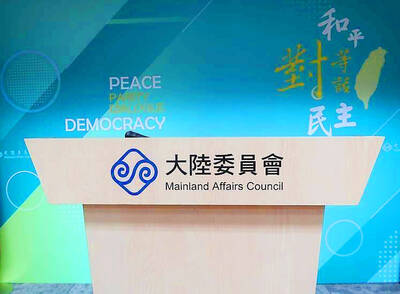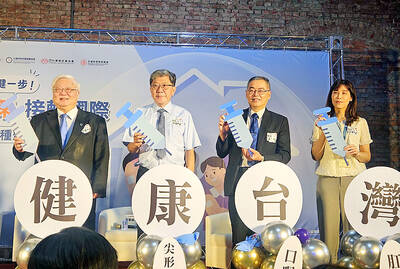French carmaker PSA Peugeot Citroen said yesterday it is in talks with Mitsubishi Motors Corp that could lead to a “strategic partnership.”
In a statement, France’s biggest automaker said it “confirms that it has started discussions with Mitsubishi Motors ... concerning the possibility of extending their relationship which could lead to a strategic partnership.”
The statement did not go as far as a report in Japan’s Nikkei Shimbun which said that Peugeot Citroen will buy a 30 percent to 50 percent stake in Japan’s fourth largest automaker for up to ¥300 billion (US$3.4 billion).
The report sent shares in Mitsubishi soaring. They closed up 13.4 percent at ¥135 in Tokyo after earlier soaring nearly 20 percent.
On Wednesday, Peugeot Citroen shares closed up 1.3 percent at 24.59 euros (US$37.17).
Mitsubishi declined to confirm the Japanese newspaper report, which gave no sources. However, the Japanese company issued a statement saying: “There are no facts to be announced.”
The paper said Peugeot Citroen — Europe’s second biggest car company — and Mitsubishi are in the final stages of capital tie-up talks.
The deal could effectively put Mitsubishi under Peugeot Citroen’s control, creating the world’s sixth-largest automobile alliance.
The French carmaker may seek more than a 50 percent stake in Mitsubishi, hoping to tap into Mitsubishi’s expertise in electric vehicles and other environmental technology, the paper said.
Paris-based Peugeot Citroen said it has already worked with Mitsubishi on product development with cooperation on 4x4 vehicles, clean technologies with electric vehicles and a joint venture in Russia.
The electric car, to be launched in Europe by the end of next year, will be based on Mitsubishi’s i-MiEV, which was launched on the Japanese market in June.
Mitsubishi will make 2,000 units of the i-MiEV in the current fiscal year to March next year. The company said yesterday it aims to boost i-MiEV production to 15,000 units by March 2012.
In Russia they have set up an auto factory to make mid-sized sport utility vehicles. Production at the Russian joint venture will begin in early 2012.
Mitsubishi had formed a capital tie-up with German automobile maker DaimlerChrysler AG, which held a 37.3 percent stake in the Japanese automaker. But Stuttgart-based DaimlerChrysler sold the entire stake in Mitsubishi in 2005, putting an end to the tie-up.
ADDTIONAL REPORTING BY STAFF WRITER

A Chinese aircraft carrier group entered Japan’s economic waters over the weekend, before exiting to conduct drills involving fighter jets, the Japanese Ministry of Defense said yesterday. The Liaoning aircraft carrier, two missile destroyers and one fast combat supply ship sailed about 300km southwest of Japan’s easternmost island of Minamitori on Saturday, a ministry statement said. It was the first time a Chinese aircraft carrier had entered that part of Japan’s exclusive economic zone (EEZ), a ministry spokesman said. “We think the Chinese military is trying to improve its operational capability and ability to conduct operations in distant areas,” the spokesman said. China’s growing

BUILDUP: US General Dan Caine said Chinese military maneuvers are not routine exercises, but instead are ‘rehearsals for a forced unification’ with Taiwan China poses an increasingly aggressive threat to the US and deterring Beijing is the Pentagon’s top regional priority amid its rapid military buildup and invasion drills near Taiwan, US Secretary of Defense Pete Hegseth said on Tuesday. “Our pacing threat is communist China,” Hegseth told the US House of Representatives Appropriations Subcommittee on Defense during an oversight hearing with US General Dan Caine, chairman of the Joint Chiefs of Staff. “Beijing is preparing for war in the Indo-Pacific as part of its broader strategy to dominate that region and then the world,” Hegseth said, adding that if it succeeds, it could derail

COMPLIANCE: The SEF has helped more than 3,900 Chinese verify documents, indicating that most of those affected are willing to cooperate, the MAC said More than 3,100 spouses from China have submitted proof of renunciation of their Chinese household registration, the Mainland Affairs Council (MAC) said yesterday. The National Immigration Agency has since April issued notices to spouses to submit proof that they had renounced their Chinese household registration on or before June 30 or their Taiwanese household registration would be revoked. People having difficulties obtaining such a document can request an extension of the deadline or submit a written affidavit in lieu of it. The council said it would hold a briefing at 2:30pm on Friday at the immigration agency’s Taichung office in cooperation with the

The government-funded human papillomavirus (HPV) vaccination is to be expanded to boys at junior-high school starting in September, the Health Promotion Administration (HPA) said yesterday. The Taiwan Society of Otorhinolaryngology, Head and Neck Surgery, the Taiwan Association of Obstetrics and Gynecology, the Taiwan Immunization Vision and Strategy, the Infectious Diseases Society of Taiwan, the Taiwan Head and Neck Society, the Formosa Cancer Foundation and the National Alliance of Presidents of Parents Associations held a joint news conference in Taipei yesterday to raise public awareness about the risks of HPV infection, regardless of gender. Invited to give an address, HPA Director-General Wu Chao-chun